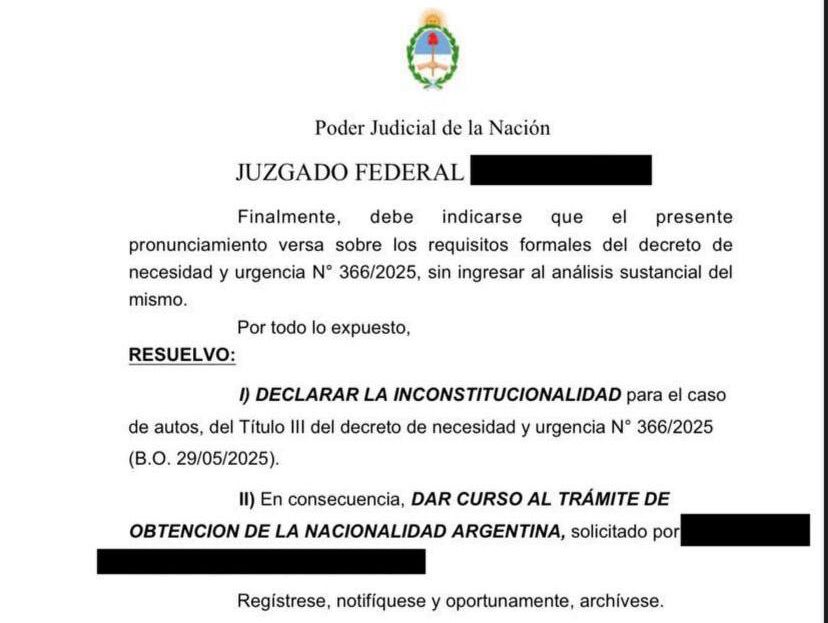- Publication date: 31 August 2025
- Reading time: 4 min
- Author: Anna Petrova
Argentine court strikes down decree tightening citizenship rules as unconstitutional
In August 2025, Argentina issued its first court ruling that could restore the previous rules for obtaining citizenship through the birth of a child. A federal court declared Decree No. 366/2025 unconstitutional — at least in the part that restricted foreign parents from applying for citizenship immediately after their child was born in the country.
The case was initiated by lawyers specializing in international law, including the team at My Argentina. They successfully argued that the new decree violated constitutional rights of foreigners. The court sided with them, granting the applicant in this case the right to apply for citizenship without waiting two years. This marks the first — but significant — legal precedent that could influence many similar cases.
Lawyers are already filing lawsuits on behalf of other families. The legal community described the decision as “a signal of returning to the rule of law.”

What changed in May 2025
On May 29, 2025, Argentina signed Decree No. 366/2025, which drastically tightened immigration rules. Key restrictions included:
- Foreigners could no longer apply for citizenship immediately after the birth of a child or marriage to an Argentine citizen.
- Applicants had to live in Argentina for two years with a valid residence permit (DNI) — without leaving the country — before applying.
- Temporary residency status (“precaria”) was no longer counted.
- Access to free healthcare and education was restricted: foreigners had to purchase private insurance and pay tuition fees.
- Fast-track citizenship remained available only to large investors (from $500,000 upwards, according to My Argentina experts).
- All applications were placed under the exclusive control of the immigration authority, removing the option of going directly to court.
These measures took effect immediately and affected thousands of applicants — particularly parents of newborn Argentine citizens.
August 2025: court rules in favor of parents
From the moment the decree was signed, lawyers, human rights advocates, and immigration attorneys raised concerns about its constitutionality. Critics pointed out that it limited a fundamental right to citizenship guaranteed by Argentina’s Constitution and bypassed the proper legislative process by excluding parliamentary debate.
On August 27, 2025, a court issued the first ruling confirming these arguments. It sided with the applicant and declared the decree unconstitutional — at least in relation to the right of foreign parents of Argentine-born children to apply for citizenship.
Excerpt from the Argentine court ruling declaring the migration law amendments unconstitutional:

This ruling is specific to one case but establishes an important legal precedent:
- Argentina’s Constitution does not allow restrictions on birthright citizenship, and the court reaffirmed this.
- The decree was enacted without legislative approval, making it vulnerable in court.
- Argentina’s legal system recognizes precedent: similar cases are likely to succeed.
While the decision may still be appealed, lawyers emphasize that the path to citizenship through childbirth in Argentina remains open — and enforceable in court.
What remains unchanged
- Children born in Argentina still automatically acquire citizenship under jus soli (right of the soil).
- Parents of Argentine-born children can obtain residency, stay legally in the country, and eventually apply for a second citizenship.
- Argentina remains one of the most popular destinations for “birth tourism” among foreigners.
What this means for families planning birth in Argentina
The new rules may complicate — but do not eliminate — the path to citizenship for parents. Having a child in Argentina still allows you to:
- Secure citizenship for your child, granting visa-free access to 160+ countries.
- Access world-class medical care at highly affordable rates.
- Establish a legal pathway for accelerated naturalization.
Argentina’s judicial system has confirmed that automatically restricting parents’ right to citizenship violates the Constitution. Even as laws evolve, opportunities for citizenship remain. The key is to proceed with proper legal guidance.
If you are planning childbirth in Argentina, it’s essential to understand the updated legal framework and prepare documentation in advance. With the support of experienced lawyers from My Argentina, families can navigate the new rules and secure citizenship successfully.




